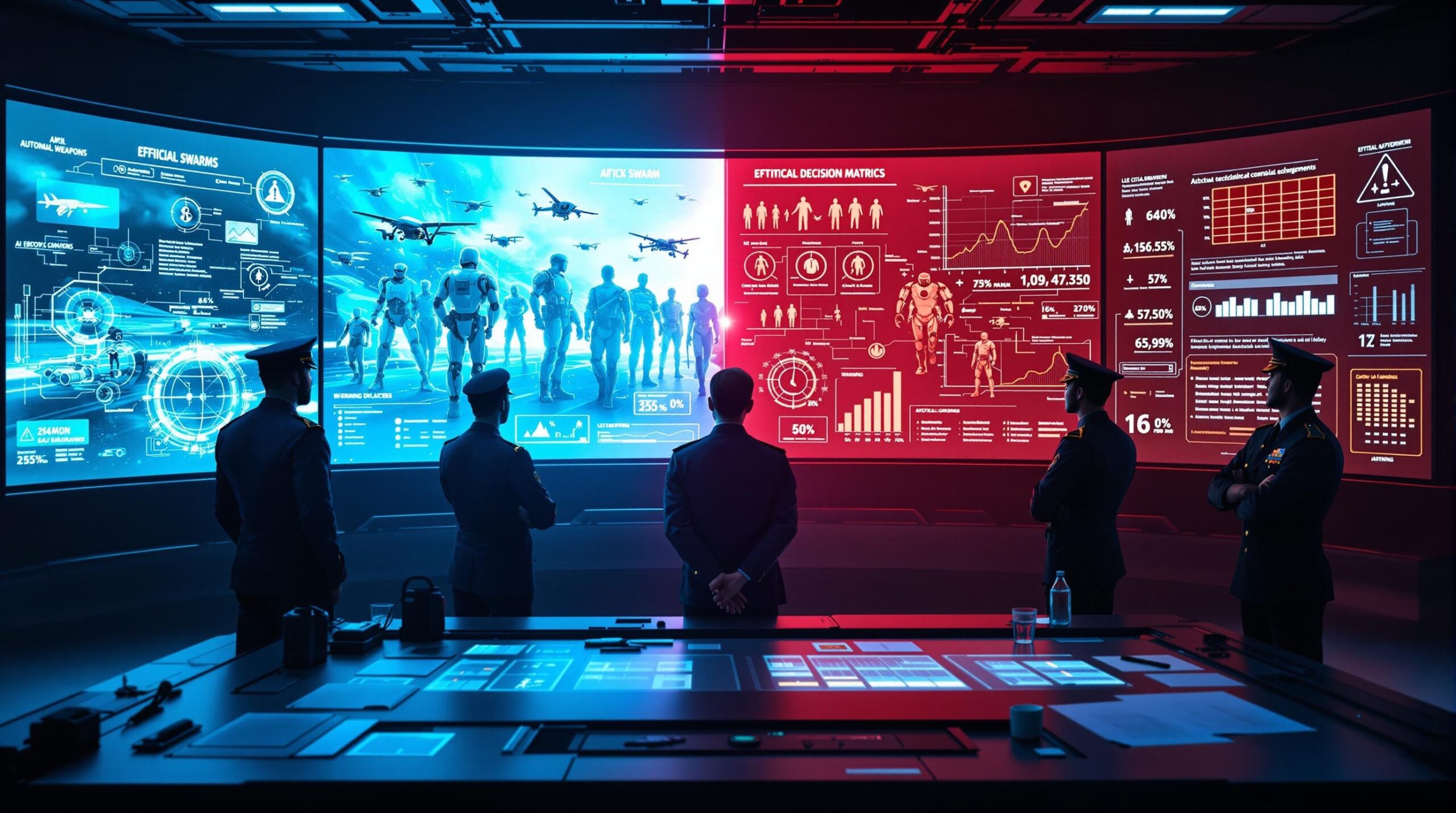The deployment of autonomous weapons systems has ignited intense debate within the realm of military ethics, forcing defense establishments to confront profound questions about delegating lethal decision-making to artificial intelligence. As military ethics frameworks struggle to keep pace with rapidly evolving AI capabilities, stakeholders from military leadership to international humanitarian organizations are grappling with the moral implications of removing human judgment from the battlefield.
Key Takeaways
- The autonomous weapons market is projected to reach $30.16 billion by 2030, growing at 10.4% CAGR
- Current U.S. policy requires “meaningful human control” over autonomous weapons systems
- Over 30 countries and 165 NGOs advocate for a complete ban on fully autonomous weapons
- Military ethics frameworks face challenges with accountability gaps when responsibility is diffused across designers, programmers, and commanders
- Technical vulnerabilities in AI systems raise concerns about bias perpetuation and potential civilian casualties
The Rise of Autonomous Weapons and Military Ethics Challenges
The rapid development of autonomous weapons systems (AWS) has created unprecedented challenges for military ethics frameworks worldwide. With the market projected to reach $30.16 billion by 2030 and growing at a 10.4% CAGR according to Allied Market Research, the ethical stakes have never been higher. These “killer robots” raise fundamental questions about whether machines should make life-and-death decisions traditionally reserved for human judgment.
At the core of military ethics concerns is the diffusion of responsibility. When autonomous systems select and engage targets, accountability becomes distributed across a complex network of designers, programmers, and military commanders. This fragmentation creates significant challenges for traditional military ethics frameworks that rely on clear chains of command and moral agency.
Current U.S. policy attempts to address these military ethics dilemmas through DOD Directive 3000.09, which mandates “meaningful human control” over autonomous weapons. However, interpretations of this directive vary globally, creating inconsistent standards for ethical deployment. Meanwhile, over 30 countries and 165 NGOs actively advocate for a complete ban on fully autonomous weapons, highlighting the deep divisions in the international community.

Human Responsibility in Military Ethics of AI Warfare
The preservation of human dignity stands at the center of military ethics when confronting autonomous warfare technologies. Current U.S. policy not only requires human oversight but also mandates senior-level reviews before AWS deployment, recognizing the profound ethical implications of delegating lethal force to machines. This approach reflects the understanding that military ethics must evolve alongside technological capabilities.
There’s growing concern among ethicists that AI decision support systems risk eroding traditional military virtues like courage and moral judgment. Penn State researcher Alan Wagner has argued that robots’ inability to properly distinguish combatants increases civilian casualty risks, creating fundamental tensions with established military ethics principles that prioritize civilian protection.
A 2023 study published in PMC warns that AI-controlled drone swarms represent a potential “third revolution in warfare,” with profound implications for military ethics. This revolution distributes ethical responsibility across a complex chain from designers to military personnel, challenging conventional notions of accountability and moral agency in armed conflict.
Technical Vulnerabilities and Military Ethics Considerations
AI systems in autonomous weapons face significant technical challenges that directly impact military ethics. According to the International Committee of the Red Cross (2024), these systems may perpetuate biases present in training data, potentially leading to discriminatory outcomes in targeting decisions. This risk creates profound concerns for military ethics frameworks that emphasize the principles of distinction and discrimination on the battlefield.
The U.S. Department of Defense established ethical AI guidelines in 2020 based on principles of Responsibility, Equitability, and Traceability to address these vulnerabilities. These guidelines represent an attempt to align technical capabilities with established social bias mitigation approaches and ethical standards.
Semi-autonomous systems that maintain human oversight dominated the 2020 AWS market revenue, reflecting the current preference for maintaining human judgment in lethal decision-making. However, adversarial testing continues to reveal concerning vulnerabilities to hacking, spoofing, and other forms of interference that could compromise ethical safeguards and lead to unintended harm.
Military Ethics in Global Governance of Autonomous Weapons
International policy regarding autonomous weapons and military ethics remains deeply divided. In 2023, 52 nations signed the U.S.-led Political Declaration favoring voluntary guidelines, while an Austria-led coalition continues to push for a binding treaty that would ban fully autonomous weapons altogether. This division reflects fundamental disagreements about how military ethics principles should be applied to emerging technologies.
The UN Convention on Certain Conventional Weapons (CCW) debates remain deadlocked over regulatory approaches, highlighting the challenges of establishing global ethical standards for autonomous weapons. According to Arms Control, these deadlocks reflect profound differences in how nations balance military advantage against ethical constraints.
National approaches to military ethics vary significantly. The U.S. dominates the Asia-Pacific autonomous weapons market ($11.56B in 2020) through firms like BAE Systems and Raytheon, while Canada rejects fully autonomous AWS but permits semi-autonomous systems that maintain human oversight, according to a 2021 study from Concordia University.
Balancing Innovation and Military Ethics in AI Warfare
Finding the balance between technological innovation and military ethics represents one of the most significant challenges in modern warfare. As noted by researchers at RAF Centre for Air and Space Power Studies, military organizations must develop frameworks that allow technological advancement while maintaining ethical constraints that preserve human dignity and minimize harm.
The integration of AI into military decision-making requires careful consideration of both technical capabilities and ethical implications. According to Army University Press, military leaders need to develop new competencies that blend technical understanding with traditional military ethics principles to effectively oversee these systems.
I believe that advancing dynamic leadership in AI-integrated environments represents a crucial frontier for military ethics. Organizations must invest in training programs that prepare personnel to understand both the technical limitations and ethical implications of autonomous systems, ensuring proper oversight and adherence to established military ethics frameworks.
The Future of Military Ethics in Autonomous Warfare
The evolution of military ethics in relation to autonomous weapons will likely require new frameworks that specifically address the unique challenges of AI-driven warfare. As noted in a SSRN paper, traditional ethical approaches may prove insufficient for addressing the novel moral questions raised by fully autonomous systems.
The concept of “meaningful human control” will continue to be central to military ethics debates, though its practical implementation remains contested. According to Congressional Research Service, defining appropriate levels of human oversight represents one of the most significant challenges for policymakers and military ethicists alike.
Effective governance of autonomous weapons will require multidisciplinary collaboration between military strategists, ethicists, technical experts, and international humanitarian organizations. As highlighted by Falcon Editing, only through such comprehensive engagement can emerging military ethics frameworks adequately address the complex challenges posed by AI-driven warfare technology in the years ahead.
For those interested in exploring these topics further, I recommend reviewing expert articles that dive deeper into the ethical dimensions of artificial intelligence across various contexts.
Frequently Asked Questions
What are autonomous weapons systems in military ethics contexts?
Autonomous weapons systems (AWS) are military platforms that can select and engage targets without direct human intervention. In military ethics frameworks, these systems raise profound questions about delegating lethal decision-making to machines and challenge traditional notions of moral agency, accountability, and adherence to international humanitarian law principles like distinction and proportionality.
How does current U.S. policy address military ethics in autonomous weapons?
Current U.S. policy addresses military ethics concerns through DOD Directive 3000.09, which requires “meaningful human control” over autonomous weapons systems. This policy mandates senior-level reviews before AWS deployment and established ethical AI guidelines in 2020 based on principles of Responsibility, Equitability, and Traceability to ensure human oversight remains central to weapons deployment.
What international efforts exist to regulate autonomous weapons under ethics principles?
International regulation efforts remain divided, with 52 nations signing the 2023 U.S.-led Political Declaration favoring voluntary guidelines, while an Austria-led coalition pushes for a binding treaty banning fully autonomous weapons. Over 30 countries and 165 NGOs advocate for a complete ban, and UN Convention on Certain Conventional Weapons debates continue regarding how to apply military ethics principles to these emerging technologies.
What are the key technical vulnerabilities affecting ethics in AI warfare?
Key technical vulnerabilities include AI systems potentially perpetuating biases in training data leading to discriminatory targeting, vulnerability to hacking and spoofing that could compromise ethical safeguards, difficulties in navigating complex battlefields while adhering to ethical principles, and risks of uncontrolled interactions causing conflict escalation similar to financial market flash crashes.
How does military ethics address accountability with autonomous weapons?
Military ethics frameworks struggle with accountability for autonomous weapons because responsibility becomes diffused across designers, programmers, and military commanders. This creates “accountability gaps” that challenge traditional military ethics approaches requiring clear moral agency. Current approaches emphasize maintaining human oversight to preserve accountability chains, though practical implementation varies widely among different nations and military organizations.
What is the projected market growth for autonomous weapons systems?
According to Allied Market Research, the autonomous weapons market is projected to reach $30.16 billion by 2030, growing at a 10.4% CAGR. The U.S. currently dominates the Asia-Pacific autonomous weapons market, which was valued at $11.56 billion in 2020, through defense contractors like BAE Systems and Raytheon, indicating significant commercial interest despite ongoing military ethics debates.
Sources:
Allied Market Research
International Humanitarian Law
Penn State
PMC
ICRC
Concordia University
Centre for Air and Space Power Studies
ICRC Law and Policy Blog: “Transcending Weapon Systems: The Ethical Challenges of AI in Military Decision Support Systems”
Army University Press: “The Ethics of Robots in War”
Arms Control Association
Falcon Editing: “The Ethics of AI in Autonomous Weapons”




